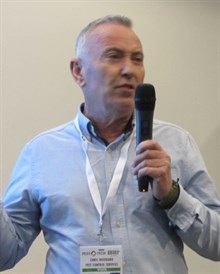2017 saw a new venue for PestTech the Ricoh Arena in Coventry. This meant that PestTech 2017 offered a range of technical presentations in a much more accessible and presentation friendly facility. Once again the presentations spanned a wide variety of topics and all were well attended.
| Controlling house mice in the food industry Chris Swindells from Acheta Consulting updated delegates on what seems to be an increasing problem with house mice in the food sector. He began by pointing out that the last 12 months has seen two high street giants being hit with six-figure fines resulting from mouse infestations. This led Acheta Consulting to check on its client base of food producers to see how common mouse infestations were. Of 180 sites some 25% showed regular/recurring activity resulting from an infestation resident within the building. Fewer than a third had no internal activity. This is a problem on the increase but why? Chris conjectured that the answer is a complex one involving loss of products as well as recent constraints on the use of others, but also on complacency – over reliance on monitors, not thinking ‘3-dimensionally’, concentrating on too few known entry points and failure by the client to ‘escalate’ problems and by the pest professional in terms of inadequate follow ups. Acheta is concerned that mice are actively avoiding bait boxes of all types and thus sometimes significant problems were going unnoticed. A monitoring trial has been undertaken using a combination of electronic monitoring devices and u/v tracking dust. Traps and both plastic and cardboard bait stations were also placed. The results demonstrated some 40% of monitoring points were triggered at least once but that activity on baits and bait boxes was limited to just two – one in a plastic and one in a cardboard bait station. Whilst he urged more widespread use of electronic monitoring, Chris observed that most current monitoring systems were dependent on mice triggering a trap or taking a bait. Changes surrounding aluminium phosphide |
|
|
| As David Cross from Rentokil explained these have come about, in part, as a result of the transfer of the approval from the Control of Pesticides regulations and, partly, as a result of changes to the Occupational Exposure Limits (OEL). Look out for more detail on these changes in the next issue Pest Magazine.
In summary users of products for vertebrate control can anticipate:
Discussions are still underway on a number of issues, not least conflicting opinions on how the application equipment should be vented after use. Hopefully this is about to be resolved but it has led to the withdrawal from the market of aluminium phosphide products for rat control. |
||
| Flies on waste: Changes and challenges Although it is one of the most common of insect pests and one with great potential to spread disease, not many pest control contractors are involved in the resolution of fly problems, particularly when those problems arise from dealing with waste. Much of the work is done in-house. Clive Boase from The Pest Management Consultancy described how dealing with domestic waste has changed over recent years. The days when waste was collected and sent to landfill are now long gone. Green waste is now separated out for composting as is food waste after anaerobic digestion. Metals, plastic and paper are separated out for recycling and the residual waste is dried and used for fuel with a much smaller fraction going to landfill. The result of this is that more waste is retained for longer during reprocessing and this has led to larger, more complex fly problems, often in urban areas, leading to increased use of insecticides. Clive concluded by describing a variety of new monitoring and control challenges. Non-native species He emphasised the need to check on current legislation before embarking on any control programme as this can, and does, change. His session was interspersed with a few entertaining anecdotes relating to his days at Stevenage Borough Council. These were largely to do with councillors who simply had no idea of what practical pest control entails. We suspect that may sound all too familiar to many of today’s local authority pest professionals. |
|
|



 Chris Swindells from
Chris Swindells from 
